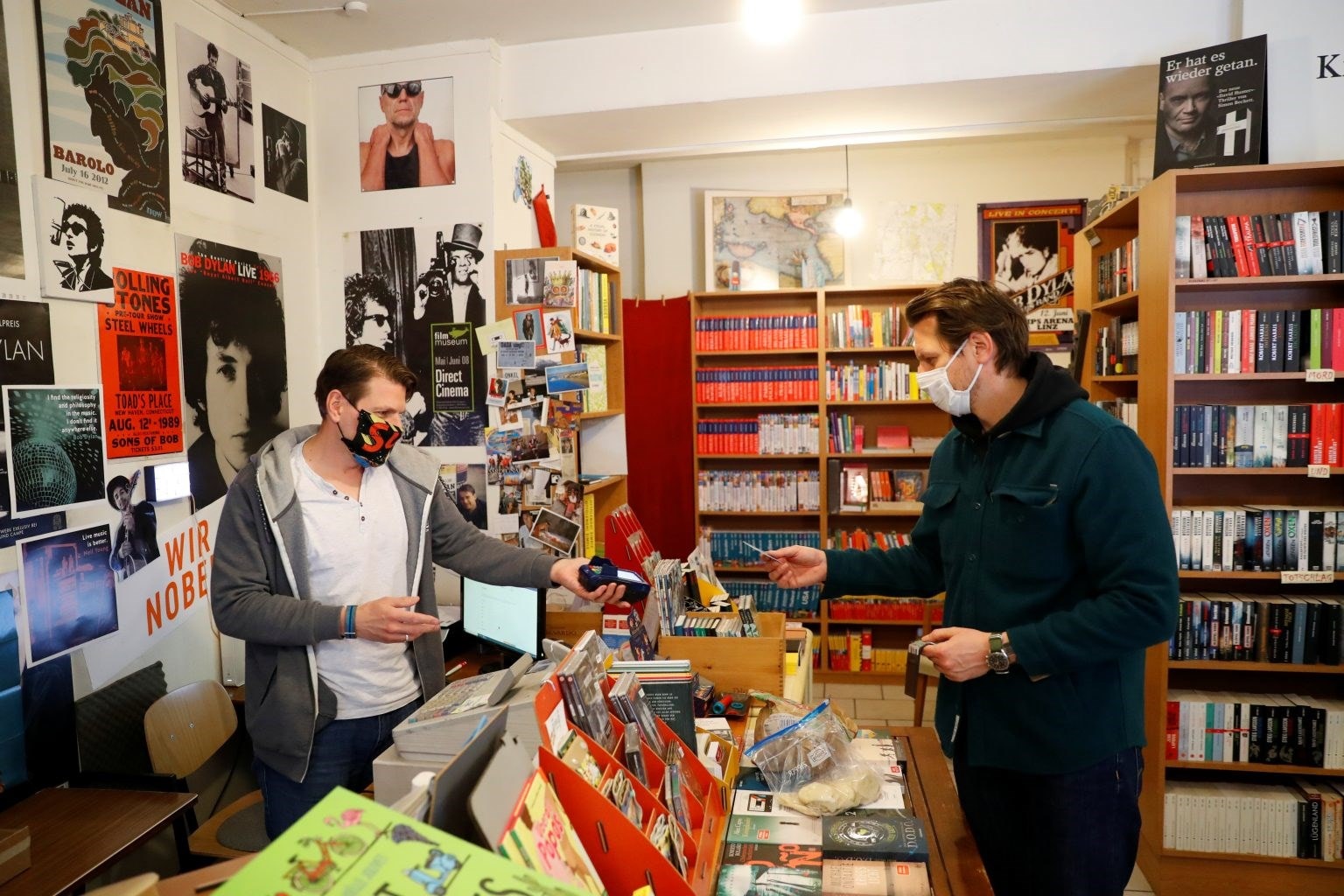WHO: Should wait at least 2 more weeks to ease restrictions
Countries that are easing restrictions to contain the spread of the COVID-19 pandemic should wait at least two weeks to assess the impact of the changes before moving forward, the World Health Organization (WHO) said on April 15.
 |
| WHO says easing restrictions should be gradual. Photo: AFP |
In its latest Strategy Update, WHO said the world is at a “critical turning point” in the COVID-19 pandemic, stressing that “speed, scale and equity must be the guiding principles” when deciding what measures are needed.
According to WHO, each country should implement comprehensive public health measures to maintain stable case numbers at low or no transmission, as well as prepare the capacity to respond rapidly to control the spread of the disease.
Some of the countries hardest hit by COVID-19 are considering lifting lockdowns and starting to move towards a return to normal life. The WHO update says any steps should be taken gradually, with time to assess their impact before moving forward.
“To reduce the risk of resurgence, restrictions should be lifted in phases, based on an assessment of the epidemiological risks and socio-economic benefits of lifting restrictions for different workplaces, educational institutions and social activities,” WHO said.
“Ideally, there would be two weeks (corresponding to the COVID-19 incubation period) between each phase of the transition, allowing enough time to understand the risk of new outbreaks and to respond appropriately,” the WHO said, warning that “the risk of resurgence and outbreaks of COVID-19 will continue.”
The WHO's advice comes as some countries begin to plan for lifting restrictions. China has begun to lift some of the strict restrictions imposed in Hubei province, where the COVID-19 outbreak began late last year. In the United States, which has the world's highest number of COVID-19 cases and deaths, President Donald Trump said he would authorize state governors to implement plans to reopen American businesses when the time is right.
WHO has previously warned countries to be cautious about lifting restrictions to prevent the spread of the COVID-19 pandemic. Speaking at a press conference, WHO Director-General Tedros Adhanom Ghebreyesus stressed that lifting restrictions could lead to a “deadly” resurgence of the disease and said that restrictions must be lifted gradually and under control, not all at once.
According to the online statistics site worldometers.info, as of 7:30 a.m. on April 16 (Vietnam time), the total number of COVID-19 cases recorded worldwide was 2,077,839. The pandemic caused by the SARS-CoV-2 virus has been present in 210 countries worldwide, taking the lives of 134,375 people. The world has also recorded 509,853 recoveries. Currently, the US and European countries continue to lead the world in the number of infections and deaths.
To date, the US has recorded 643,508 cases of infection, including 28,506 deaths. In the past 24 hours, the country also recorded 2,459 deaths due to COVID-19.
In Europe, Spain currently leads in the number of infections with 177,644 positive cases of SARS-CoV-2, including 18,708 deaths. Italy has recorded the highest number of deaths on the continent with the number surpassing 21,000, including 165,155 infections. France has recorded 165,155 infections and 17,167 deaths. Germany has 134,753 infections and 3,892 deaths. The UK has 98,476 infections and 12,868 deaths.
Many European countries begin to ease restrictions
 |
| Austria is the first country in Europe to ease restrictions. Photo: cyprus-mail.com |
Austria has become the first country in Europe to ease restrictions imposed to curb the spread of the COVID-19 pandemic. After recording a steady decline in new infections, the government has allowed thousands of shops across the country to reopen from April 14 in an effort to maintain “normal life” for its citizens.
Under the proposed easing of restrictions, Austria will reopen schools, restaurants and hotels from mid-May. However, the Austrian government still recommends that people wear masks when shopping and still adhere to appropriate social distancing regulations to prevent the possibility of a further outbreak.
Since April 13, Spain has begun to ease lockdown measures, allowing businesses, including manufacturing facilities and the construction industry, to resume operations as the government seeks to restart production.
Prime Minister Pedro Sanchez has allowed some workers to return to work, while police and the Red Cross are handing out masks at train stations to commuters. But retail stores and services remain closed and office workers are still required to work from home. Shops, bars and public spaces are expected to remain closed until at least April 26.
Spanish Prime Minister Pedro Sanchez said the government decided to reopen some sectors after consulting a committee of experts. He stressed that the resumption of activities depends on the results of the fight against COVID-19 in the country.
Similar to other countries, the Italian government also started allowing bookstores, stationery stores and children's clothing stores to reopen from April 14, although the nationwide lockdown is in place until May 4. However, the regions most affected by the COVID-19 epidemic such as Lombardy and Piemonte continue to require businesses to close. Despite the decision to ease restrictions, Italy still recommends that people practice personal hygiene and social distancing to prevent the spread of the disease.
On April 15, Denmark also began reopening schools after more than a month of closure to prevent the spread of COVID-19. This is the first country in Europe to decide to reopen schools. Kindergartens and primary schools have reopened after being closed since March 12. However, students are still required to follow social distancing regulations to ensure safety.
The reopening of schools is currently only in about 50% of Denmark’s administrative regions. In Copenhagen alone, the number of schools reopening accounts for about 35%. All kindergartens and primary schools in Denmark are expected to reopen on April 20. Meanwhile, middle and high school students will continue to study online and are expected to return to school on May 10.
In Finland, Prime Minister Sanna Marin announced the lifting of travel restrictions to and from the capital Uusimaa, which had been in place since March 28 to prevent the spread of COVID-19.
EU calls for cooperation to fight COVID-19
 |
| European Commission President Ursula von der Leyen and European Council President Charles Michel at a joint press conference on April 15. Photo: AP |
At a joint press conference of the European Commission (EC) held in Brussels on April 15 on the European Union's (EU) response to the COVID-19 crisis, EC President Ursula von der Leyen called on EU countries to continue to coordinate and provide a roadmap to lift restrictions to prevent the COVID-19 pandemic from spreading across the bloc amid the pandemic that has killed about 80,000 people in Europe. This number accounts for two-thirds of the global death toll.
“While the path back to normality will take time, it is clear that we cannot maintain these restrictions indefinitely,” she said, unveiling a 14-page plan for lifting restrictions across the bloc.
Ursula von der Leyen said the restrictions imposed by countries across the continent had proved effective, but had also caused a huge economic shock and were putting a heavy burden on public life. EU officials said the bloc’s economy could shrink by as much as 10% this year, a decline not seen since the global economic crisis of the 1920s.
Therefore, Ms. Ursula von der Leyen called on the 27 EU member states to coordinate to lift restrictions as well as to cooperate to respond to the pandemic in the coming time. She warned: "Inadequate coordination in lifting restrictions will pose risks for all member states and may create tensions between countries". Ms. Ursula von der Leyen emphasized that there is no solution that is suitable for all countries, so member states should try to coordinate and inform each other about the steps taken.
At the start of the outbreak, many EU member states closed their borders or imposed travel restrictions without giving any advance notice. Ursula von der Leyen hopes that the reopening of borders in the future will be done in a more systematic way.
The plan, presented by Ursula von der Leyen, outlines three conditions that must be met before restrictions can be eased: (1) the national health system is no longer under stress; (2) the rate of new infections has decreased; (3) particularly vulnerable groups can be further protected.
According to her, the gradual easing of restrictions will inevitably lead to new infections. Therefore, the steps must be closely monitored, and even more drastic measures may have to be imposed. Ms. Ursula von der Leyen said: "We will have to live with the virus until a vaccine is developed."
EU officials have recently discussed the bloc's upcoming long-term budget package that should be used to support economic recovery from the COVID-19 pandemic.
Speaking at a joint press conference with Ursula von der Leyen, President of the European Council Charles Michel said that at an online conference on April 23, leaders of the 27 EU member states will discuss plans for the common budget for the period 2021-2027.
Mr. Michel stated that at this conference, the EU will make strategic adjustments to the common budget of the union to support economic recovery. The goal is to bring the EU single market back to life after the blockade measures and provide additional support to EU citizens. In addition, he also called on EU leaders to unite in the future, while drawing lessons from the current COVID-19 crisis./.



.jpg)
![[Infographics] 5 biện pháp phòng, chống dịch COVID-19 [Infographics] 5 biện pháp phòng, chống dịch COVID-19](https://bna.1cdn.vn/thumbs/540x360/2025/05/22/anh-2.jpg)

-5b8619d675cc4f38cedd8c853332ddab.jpg)

